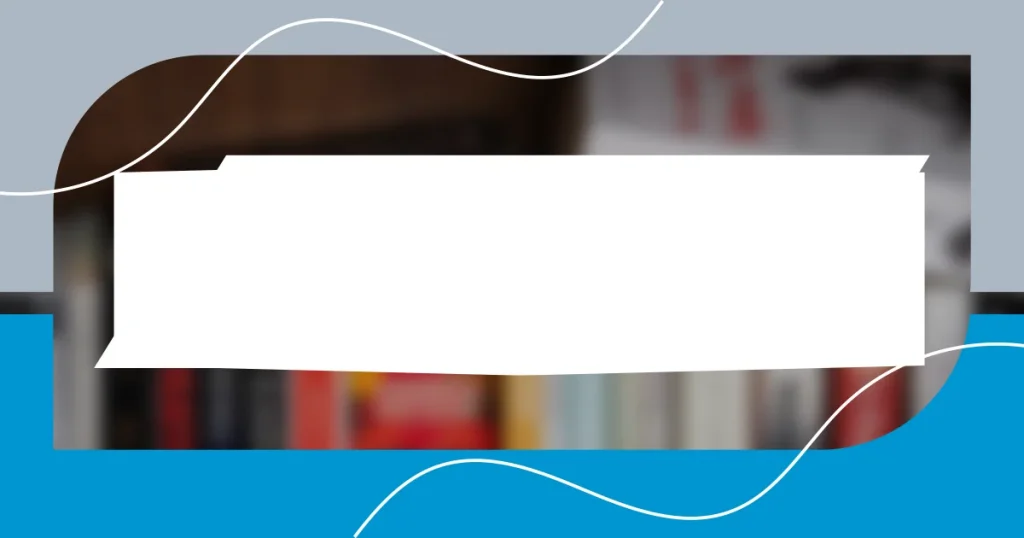Key takeaways:
- Understanding your personal voice involves self-reflection and embracing uniqueness through authentic expression and emotional connection with readers.
- Assessing vocal style requires experimenting with different formats and recognizing patterns in tone, emotion, and consistency to grow naturally.
- Building confidence in your voice can be achieved through practice in varied environments, seeking feedback, and challenging yourself with spontaneous speaking exercises.

Understanding your personal voice
Understanding your personal voice is like embarking on a journey of self-discovery. I remember the first time I read something I wrote out loud; it felt foreign yet exhilarating. How often do we question if our true selves come through in our writing?
To me, finding that voice means embracing every facet of who I am, including my quirks and insecurities. It’s about allowing my personality to shine through the words I choose. When I write, I often think back to the moments that make me feel alive—those experiences that evoke powerful emotions—and I weave those sentiments into my voice.
I encourage you to reflect on what makes you unique. Have you thought about the values that resonate with you? I find that tapping into my passions brings authenticity to my writing. When I let my guard down and speak from the heart, I create a genuine connection with my readers, and that’s where my true voice emerges.

Assessing your current vocal style
Assessing your current vocal style involves a deep dive into how you express yourself, both in writing and speaking. I remember going through old journal entries; it was like unearthing a time capsule. I could see the evolution of my voice and style over the years, highlighting how different experiences shaped my vocal expression. Reflecting on my journey, I discovered that varying circumstances and emotions can change how I write or speak.
When I listen to recordings of myself, I sometimes find it surprising how much my tone can shift based on my mood or the topic at hand. It’s essential to identify those patterns. Are you more formal when discussing serious matters or more relaxed when sharing personal anecdotes? By pinning down these nuances, I’ve learned to lean into my natural style, letting it grow as I do.
As I assess my vocal style, it’s crucial to experiment with different formats. I’ve found that writing poetry allows me to play with rhythm and emotion in ways that prose doesn’t always allow. Keeping a variety of writing styles on hand promotes flexibility, just like a musician practices different genres. Have you tried mixing styles? It can reveal aspects of your voice that surprise even you.
| Aspect of Vocal Style | Self-Assessment Insights |
|---|---|
| Tone | Formal vs. Informal |
| Emotion | How do personal experiences shape your expression? |
| Consistency | What tone do you maintain across different formats? |

Techniques to develop vocal skills
Developing vocal skills is a practical journey where one can explore various techniques to refine expression. Personally, I find value in vocal exercises that enhance clarity and tone. One memorable experience was joining a local speaking club, where practicing in front of others taught me to project my voice confidently. This real-time feedback helped me understand how pacing and emphasis can dramatically change the delivery of my message.
Here are some techniques I’ve found effective for building vocal skills:
- Breath Control: Deep belly breathing exercises help me maintain a steady voice.
- Articulation Drills: Tongue twisters are not only fun; they improve clarity and precision.
- Vocal Warm-ups: Simple humming or scales can prepare my voice for speaking or singing.
- Recording Practice: Listening to recordings of my voice allows me to identify areas for improvement and track my progress.
- Imitating Styles: Trying different speaking styles, such as dramatic or conversational, expands my range and versatility.
Each of these methods contributes to a fuller understanding of my vocal strengths and weaknesses.

Exploring different vocal genres
Exploring different vocal genres has been a game-changer in how I express myself. I recall the first time I tried my hand at spoken word poetry; the rhythm and flow felt exhilarating. It was as if I had unearthed a completely new facet of my voice that had been hidden beneath layers of formality. Have you ever experienced that rush of creativity when stepping outside your comfort zone?
Dabbling in genres like storytelling or improv has also shaped my vocal expression. Just the other day, I attended a storytelling workshop where the instructor encouraged us to embrace our quirks. This reminded me that each genre has its own nuances, inviting me to bring different emotional textures to my delivery. I often find myself wondering how adjusting my vocal style might resonate differently with my audience.
Just like a musician experimenting with new sounds, I love exploring different vocal techniques. For instance, switching between a calming, soft tone in meditation workshops and a lively, animated voice when narrating a funny story has helped me connect on multiple levels. Have you played with how your voice changes across genres? It’s fascinating to map out those shifts, revealing how versatile and adaptable our vocal expressions can be!

Practicing in varied environments
Practicing in varied environments has been pivotal for my vocal development. I remember one afternoon when I decided to practice my speeches at a bustling café instead of my quiet living room. The background noise forced me to project my voice more, which made me realize how important it is to adapt my tone and volume to different settings. Have you tried speaking in a noisy place? It can really boost your confidence and help you understand your vocal limits.
Another enriching experience was joining a community theater group. During rehearsals, I learned to adjust my delivery based on the mood of the scene and the reactions of my fellow actors. I was amazed at how the energy in the room could change my performance. The feedback from my peers prompted me to explore new inflections and emphasize different words, enhancing my ability to resonate with diverse audiences.
I also found that practicing in nature has its unique benefits. Whether it’s reciting poetry in a park or delivering a monologue by a serene lake, the natural acoustics inspire a different kind of expression. The tranquility of the environment often encourages a softer, more contemplative voice, revealing hidden emotions I hadn’t tapped into before. Have you ever noticed how your voice transforms in a peaceful setting? It’s remarkable how surroundings can influence our vocal journey!

Seeking feedback and continuous improvement
Seeking feedback is such a crucial part of my journey to finding my voice. After sharing a piece at an open mic, I remember feeling vulnerable but also exhilarated. The feedback from others—those cheers and constructive comments—made me realize how others perceive my voice and style. Have you ever considered how outside perspectives can shine a light on aspects of your vocal expression that you might overlook?
I’ve also made it a point to actively seek constructive criticism from friends and mentors. One time, a mentor pointed out that I could vary my pacing more, which opened up a whole new dimension in my delivery. It was eye-opening and, surprisingly, quite freeing! Embracing feedback can sometimes be uncomfortable, but it drives continuous improvement and helps me refine my unique voice. How do you typically respond to feedback?
Additionally, I keep a journal where I reflect on performances and the feedback I receive. This practice has evolved into a treasure trove of insights that I revisit often. It’s fascinating to track my growth over time; I can see patterns in my vocal expression that I might not have noticed otherwise. Have you ever used journaling as a way to map your progress? It’s a powerful tool for self-discovery and continuous improvement in finding your voice.

Building confidence in your voice
Building confidence in my voice has been a transformative experience. I recall a time when I stood in front of a mirror and practiced my speech. As I watched myself speak, I noticed how my body language mirrored my emotions. The more animated I became, the confidence I felt grew. Have you ever tried speaking to yourself in the mirror? It’s fascinating how much it can boost your self-assurance.
Sometimes, I like to challenge myself with spontaneous speaking exercises. I might pick a random topic and give myself just a minute to gather my thoughts before diving in. The exhilaration that comes from delivering an impromptu speech always leaves me buzzing! How thrilling is it to step outside your comfort zone and let your voice lead the way? With each impromptu attempt, I’ve found that taking risks really helps to solidify my confidence.
Finding spaces where I feel truly at ease has also been key. In quieter environments, like my favorite cozy nook at home, I let my voice flow more freely, unburdened by external judgments. But what really surprises me is how much confidence blossoms when you speak your truth without hesitation. Isn’t it liberating to find your comfort zone and, in turn, elevate your vocal presence? Embracing that comfort can pave the way for a bolder expression of who you are.
















